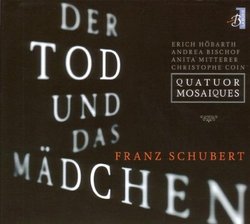| All Artists: Schubert, Quatuor Mosaiques Title: String Quartet Members Wishing: 1 Total Copies: 0 Label: Naive Original Release Date: 1/1/2010 Re-Release Date: 4/27/2010 Genre: Classical Styles: Historical Periods, Classical (c.1770-1830) Number of Discs: 1 SwapaCD Credits: 1 UPC: 810473010013 |
Search - Schubert, Quatuor Mosaiques :: String Quartet
 | Schubert, Quatuor Mosaiques String Quartet Genre: Classical
|
Larger Image |
CD Details |
CD ReviewsMasterful Performances by the Quatuor Mosa´ques J Scott Morrison | Middlebury VT, USA | 05/03/2010 (5 out of 5 stars) "To my own surprise, because I thought knew most of the Schubert quartets, I found that I could not recall ever hearing the youthful Quartet No. 9 in G Minor, D173, written when Schubert was about eighteen. I was really struck by the mastery of the construction of the first movement, with its marvelous themes (particularly the second theme which becomes a three-part canon!) and quite wonderful form. The second movement Andantino is a bit of a letdown in that it is repetitive in a way that Schubert later learned to avoid. The scherzo sounds like a tip of the hat to the peasant dancing of Beethoven's Pastoral Symphony. It is in the finale that Schubert really shows us the master that he is, or is to become. It scurries and bustles in a merry mood and has some of the feeling of Mendelssohn's Midsummer Night's Dream fairy music. For me this quartet is a real discovery. One would think that after more than fifty years of close attention to chamber music, both as player and listener, I would have encountered this work. It is a joy to have discovered it at this late date. Needless to say the Quatuor Mosaïques play it beautifully. The QM is, of course, an original-instruments group but they are not rigid about playing without vibrato and for this reason they are my favorite HIP string quartet. As for the 'Death and the Maiden' Quartet, No. 14 in D Minor, D810, there are innumerable recordings of this great work. All the major string quartets have recorded it (and some not so major) and it also has been recorded in string orchestra form. Quatuor Mosaïques need not take a back seat to any of them. This is a great performance. The quartet captures both the drama and the lyricism of the work. I've always felt that Schubert was of two minds about the subject of death, seeing it both as a comforting end to life and as a horrible consequence of life. This, of course, is not surprising considering that Schubert was weak and in pain close to the end of his own wretched life. Both feelings are present in the music and both are present in this performance. It is not clear which feeling predominates in the music. However, after the towering slow movement, the set of variations on Schubert's song 'Tod und das Mädchen', the striving scherzo and the frantic finale suggest that Schubert is reaching for the triumphant solution while recognizing that time is short. This is conveyed in the playing of Quatuor Mosaïques. Strongly recommended both for the wonderful Death and the Maiden and for the, for me, newly discovered G Minor quartet. Scott Morrison" Warmly recommended Roger Oakley | Melbourne, Australia | 07/03/2010 (4 out of 5 stars) "I've been enjoying Quatuor Mosaiques' thoughtful recording of
Schubert's A minor quartet (D804) for several years, as well as their complete Beethoven Op.18. Here they offer splendid, strong and direct accounts of two more minor-key Schubert quartets. The early G minor is quite a terse economical piece and makes an apt introduction to the intensity of the great D minor. Don't be put off by the slightly dry sound quality. Repeated hearings reveal a truthful, honest sound which allows all four voices of the quartet to be heard in equal balance and this accords well with the Mosaiques' highly musical but unsensational playing. Modern string quartets may wring more high drama from "Death and the Maiden" but I find this modestly musical approach lacks little in intensity. The moving variations of the second movement are poignantly expressed here. And the scale of the Mosaiques' performances continue to strike me as close to ideal for listening in the home. " |

 Track Listings (8) - Disc #1
Track Listings (8) - Disc #1